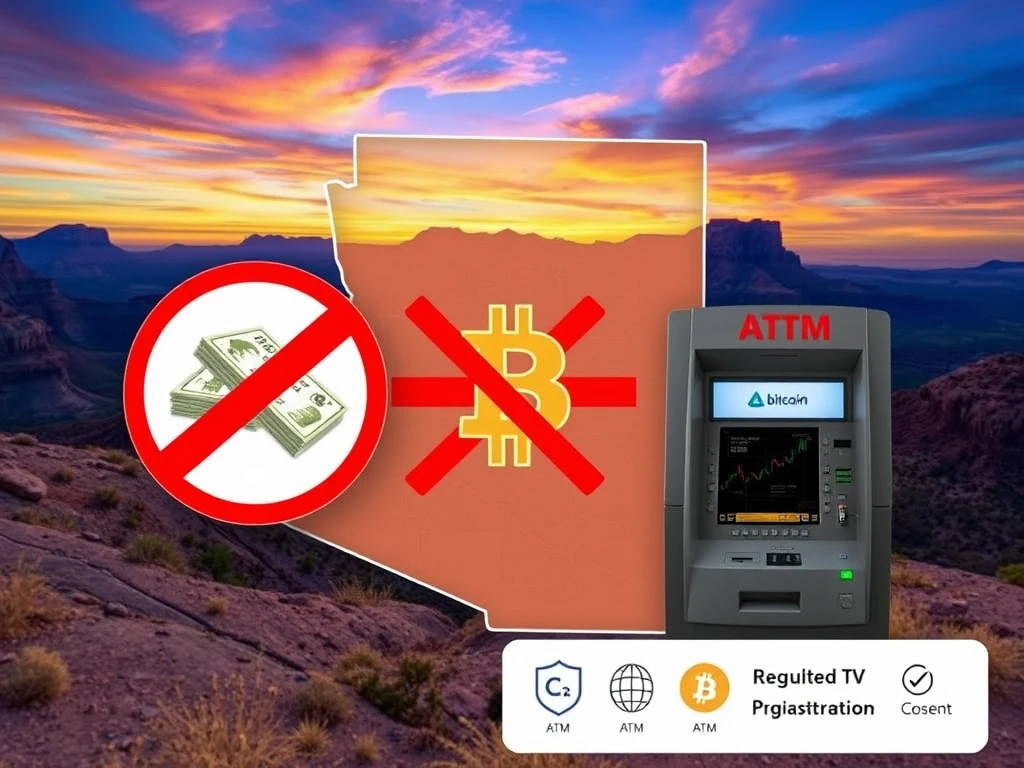Arizona Crypto Bills Face Strict Vetoes, While Bitcoin ATMs See New Rules

Arizona recently made significant moves regarding digital assets, particularly impacting future state involvement and consumer interactions. The fate of several key Arizona crypto bills hung in the balance, with Governor Katie Hobbs ultimately deciding to reject some while approving others focused on regulation.
Why Arizona Rejected Key Crypto Bills
Governor Katie Hobbs took decisive action against legislation that would have expanded the state’s direct financial exposure to digital assets. Citing volatility and risk, she vetoed two prominent bills:
- Senate Bill 1373: This bill aimed to create a Digital Assets Strategic Reserve Fund. The idea was for Arizona to hold crypto acquired through seizures or legislative means. Governor Hobbs expressed concern about using general fund dollars for this purpose, noting the market’s current instability.
- Senate Bill 1025: More ambitious, this bill proposed the “Arizona Strategic Bitcoin Reserve Act.” It would have allowed up to 10% of the state’s treasury and retirement funds to be invested in Bitcoin and other digital assets. This bill represented a significant step towards a state-level Bitcoin reserve Arizona, but the governor deemed the risk too high for public funds.
These vetoes align with a cautious approach, contrasting with efforts in other states exploring similar reserve concepts. Data shows many US states have considered or have active strategic crypto reserve bills, highlighting a national debate on state crypto holdings.
Arizona Crypto Payments: Too Much Risk?
Another casualty was Senate Bill 1024, which would have allowed state agencies to accept Arizona crypto payments for various obligations like taxes, fines, and fees. The bill proposed using approved third-party service providers to handle the transactions, theoretically shielding the state from direct price fluctuations.
However, Governor Hobbs concluded that even with intermediaries, the proposal still introduced “too much risk” for state operations. This decision means Arizonans cannot currently use cryptocurrencies to pay state-related expenses directly.
Strict Rules for Arizona Bitcoin ATMs
While blocking direct state crypto involvement, Governor Hobbs approved House Bill 2387, focusing on regulating cryptocurrency kiosks, commonly known as Arizona Bitcoin ATMs. This bill introduces stringent consumer protection measures aimed at curbing fraud and increasing transparency.
Key regulations for ATM operators include:
- Displaying clear, multilingual warnings about common crypto scams.
- Requiring users to acknowledge scam risks before completing transactions.
- Providing detailed receipts with transaction data, fees, contact info, and refund policies.
- Capping transactions at $2,000 per day for new customers and $10,500 per day for returning users (after 10 days).
- Offering 24/7 toll-free customer service, with the number clearly posted on machines.
Notably, the bill includes a provision for new users who fall victim to scams: if reported with proof within 30 days, they are entitled to a full refund, including fees. With approximately 20 active Bitcoin ATMs in Arizona, these rules significantly impact operators and users alike.
Arizona Crypto Regulation: A Balanced Approach?
The governor’s actions paint a picture of cautious Arizona crypto regulation. While hesitant to expose state funds to market volatility through reserves or direct payments, she is willing to implement rules that protect consumers interacting with digital assets through existing infrastructure like ATMs.
Adding another layer to the state’s stance, Governor Hobbs also signed House Bill 2749. This legislation updates unclaimed property laws to include digital assets, allowing the state to hold unclaimed cryptocurrencies in their original digital form rather than immediately converting them to fiat.
Looking Ahead
Arizona’s recent legislative activity demonstrates the ongoing evolution of how US states approach cryptocurrencies. The vetoes highlight concerns about financial risk, while the approved ATM regulations underscore a commitment to consumer safety in the growing digital asset space. The decision on unclaimed digital assets shows a pragmatic approach to managing digital property.
Summary
Arizona Governor Katie Hobbs has shaped the state’s immediate future with digital assets by vetoing bills for a state Bitcoin reserve and crypto payments due to risk concerns. Simultaneously, she signed a bill imposing strict consumer protection rules on Arizona Bitcoin ATMs. This balanced approach prioritizes fiscal prudence and consumer safety over direct state investment in volatile markets, setting a clear direction for Arizona crypto regulation.










